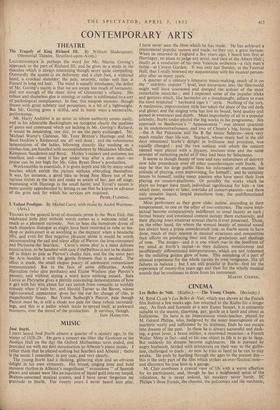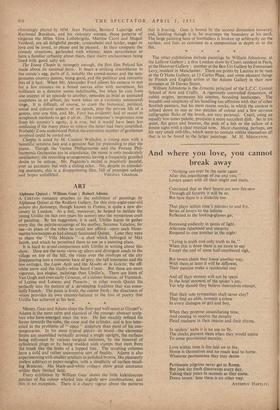CINEMA
Les Belles, de Nuit. (Rialto.)7----The Young Chopin. (Berkeley.) M. 104 CLAIR 'S Les Belles de Null, which was shown at the French film festival a few weeks ago, has returned to the Rialto for a longer stay. As fresh and fantastic as a new Easter bonnet, it is eminently suitable to the season, charming, gay, gentle as a lamb and about as frolicsome. Its hero is an impecunious music-teacher, played, by M. Gerard Philipe, who, badgered by the noisy interruptions of an inartistic world and suffocated by its drabness, finds he can escape into dreams of the past. In these he is always successful and dash- ing, a great lover, a brave soldier, a renowned musician—a French Walter Mitty in fact—and so his one object in life is to go to sleep. But suddenly his dreams become nightmares. He is pursued by angry husbands, herded with aristocrats on their way to the. guillo- tine, challenged to duels ; so now he tries as hard as he can to stay awake. He ends by hurtling through the ages to the present day— this is the only part of the film which strikes an over-farcical note— and discovers his true love in a garage. M. Clair combines a cynical view of life' with a warm affection for its participants, and, though he has a heightened sense of the ridiculous, he is never unkind, his mockery never harsh. M: Philipe's three friends, the chemist, the policeman and the mechanic,
charmingly played by MM. Jean Paredes, Bernard Lajarrige and Raymond Bussieres, and his visionary women, those patterns of elegance the Mlles Gina Lollobrigida, Martine Carol and Magali Verdeuil, are all delightful people, sympathetic and tender, eager to love and be loved, to please and be pleased. In their company the comedy situations, garlanded with whimsy, seem nevertheless to have a familiar urbanity about them, their starry enchantment being lined with good salty wit.
The Young Chopin is, strangely enough, the first film Poland has made about its national hero. It bears a striking resemblance to the curate's egg, parts of it, notably the crowd-scenes and thetein- pestuous country dances, being good, and the political and romantic bits of it bad. When Mr. Alexander Ford allows his camera to rest for a few minutes on a broad canvas alive with movement, his brilliance as a director seems indubitable, but when he cuts from one snippet of an episode to another, episodes as brief as animated snapshots in an album,, his work takes on a curiously amateurish tinge. It is difficult, of course, to cram the historical, political, social and cultural aspects of an epoch, plus the private life of a genius, into one film, and Mr. Ford has evidently had to resort to scrapbook methods to get it all in. The composer's inspiration rose from his country's agony, it is true, but it would have been less confusing if the many plans to relieve the latter had been simplified. Probably if one understood Polish the enormous number of gentlemen involved could be sorted out.
Chopin is acted by M. Czeslaw Wollejko, a young man with a beautiful sensitive face and a genuine flair for pretending to play the piano. Though the Vienna Philharmonic and the Poznan Phil- harmonia Orchestras are in attendance, the music is only moderately satisfactory, the recording arrangements having a frequently gratified desire to be untrue. Mr. Paganini's recital is positively painful, ever so pizzicato but with a sliding echo. No, despite its stimulat- ing moments, this is a disappointing film, full of promises unkept



































 Previous page
Previous page